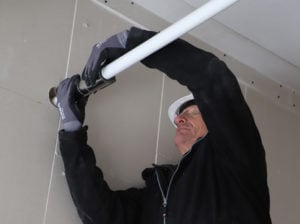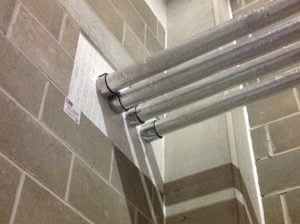 Buildings must be fire safe and people should be able to have confidence that they are. Fire and smoke spreading through the building and up the façade will threaten occupants in parts of the building remote from the fire’s start point, making escape more difficult. The safety of the building occupants and first-responders depends mainly on how the building performs during fire, including the release of thick toxic smoke, which kills more people than the fire does.
Buildings must be fire safe and people should be able to have confidence that they are. Fire and smoke spreading through the building and up the façade will threaten occupants in parts of the building remote from the fire’s start point, making escape more difficult. The safety of the building occupants and first-responders depends mainly on how the building performs during fire, including the release of thick toxic smoke, which kills more people than the fire does.
Many regulations are written to provide contractors with guidelines to build work, living and other inside environments that are fire safe. Occupants of buildings need to be able to vacate the premises without running into sudden obstructions and within a specific timeframe.
There are 3 factors that affect the fire safety of a building:
Seeking more oxygen, the flames will spread from the room where they started through any opening. A serious point of attention are the pipe and cable penetrations through the fire resistant walls and ceilings that divide the building into compartments. Fire and smoke should not be able to pass through these pipe and cable penetrations. These kind of penetrations must be sealed in an approved way; using a fire protection product system that is officially tested and approved for the specific situation. This is the only way to ensure that the prescribed fire rating of the barrier is retained.
It is not always easy to determine the best solution in passive fire protection. In order to correctly seal pipes and cables penetrating a fire barrier, it is important to know the:
For cables, cable bundles and cable trays these criteria are identical. The first three are similarly defined by knowing the type and the size of the cable, the bundle and/or the cable tray.
If the pipes are insulated, this must also be defined by:
 Situations are usually different per building, and even within the building itself situations can differ enormously. Sometimes pipes are installed at an angle, run side by side through a substrate or sockets are situated at the fire barrier. Most important is finding an approved fire safety solution and then applying it exactly as specified. Walraven’s Pacifyre® fire protection system offers a range of certified solutions. From standard to complex situations, Walraven has the experience and technical support team to help you find the best solution.
Situations are usually different per building, and even within the building itself situations can differ enormously. Sometimes pipes are installed at an angle, run side by side through a substrate or sockets are situated at the fire barrier. Most important is finding an approved fire safety solution and then applying it exactly as specified. Walraven’s Pacifyre® fire protection system offers a range of certified solutions. From standard to complex situations, Walraven has the experience and technical support team to help you find the best solution.
Do you want more information about our Walraven Pacifyre® Fire protection systems? Or can we help you in determining and planning the most effective solution for sealing your pipe and cable penetrations? Please feel free to contact us to discuss this with our experts. Our technical engineers have many years of experience solving fire protection challenges and are happy to advise you. Don’t hesitate to get in touch!